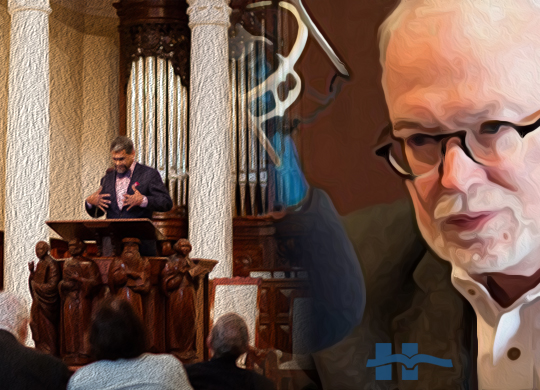Hermeneutics & Celibacy

A couple of months ago, I was at Beeson Divinity School (of Samford University) in Birmingham, AL, to deliver their William E. Conger, Jr., Lectures in Preaching.
Part of my engagements at Beeson also included an interview with the Dean of the School, Dr. Timothy George, for a podcast that he hosts.
Here is a snippet of our conversation:
Timothy George: This word, you use this word, we use it all the time here at Benson, hermeneutic, which is a big word, a confusing word to some people. Hermeneutics, scheme of interpretation, how you understand the Bible, what it is that you read and what it means. How important is that aspect, hermeneutics?
Abraham Kuruvilla: Hermes, as you know, was the messenger from the gods to humans, so he is the patron saint of all preachers. By the way, he was also the patron saint of vagabonds and thieves, so I don’t know what that means for all of us. But it’s an art of reading the text, to catch what its author is doing. If you wanted an example, I will probably use that in the lectures as we go along the next couple of days. If I’m …—Dr. George and I are sitting at a desk here for those of you listening—and if my foot is on top of his and he tells me, “Abe, your foot is on top of mine,” I can file that piece of information somewhere in the dark recesses of my brain and say, “Thank you, Dr. George, for telling me where my foot was,” and do nothing about it. But you weren’t just giving me the location of my foot on top of your foot. You were doing something with it. You were telling me to take my foot away. Unless I catch what you are doing with what you are saying, there can never be valid application. I would not know what to do with that statement. This is true of biblical texts as well, and I think that’s something that has been lacking in biblical hermeneutics for the longest time, catching the thrust and the force of the text, what the author is doing with what he is saying. Pericope by pericope, week by week, sermon by sermon ,and thereby changing my life little by little, to conform my life to the image of the Son of God.
Timothy George: So there’s a spiritual purpose.
Abraham Kuruvilla: Yes.
Timothy George: A goal.
Abraham Kuruvilla: Yes. Romans 8:29, to conform us into the eikōn [image] of his Son.
Here is the interview, in its entirety …











 Abe Kuruvilla is the Carl E. Bates Professor of Christian Preaching at The Southern Baptist Theological Seminary (Louisville, KY), and a dermatologist in private practice. His passion is to explore, explain, and exemplify preaching.
Abe Kuruvilla is the Carl E. Bates Professor of Christian Preaching at The Southern Baptist Theological Seminary (Louisville, KY), and a dermatologist in private practice. His passion is to explore, explain, and exemplify preaching.